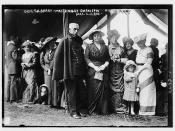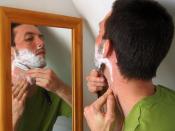In the story "Shaving," by Leslie Norris, a sixteen-year-old Rugby player, Barry, changes and accepts the inevitability of his father's death. Barry's character and maturity are changed as he dealt with the emotional crisis before him. The author's use of physical description, nature, and the ritual of shaving reinforce Barry's transition from boyhood to the responsibilities of manhood.
Leslie Norris uses the physical traits of Barry's coat, strength in sports, and hands as examples of physical changes from boyhood to manhood. The coat, which is now very tight on Barry's body, leads him to reevaluate his self-perception. Norris makes this point explicitly in the opening paragraph: He flexed his shoulders against the tightness of his jacket and was surprised again by the unexpected weight of his muscles, the thickening strength of his body. A few years back, he thought, he had been a small unimportant boy, one of a swarming gang laughing and jostling to school, hardly aware that he possessed and identity.
But time had transformed him. He walked solidly now, and often alone"æ the rooms in which all his life he'd moved had grown too small for him.
Barry was characterized as being tall, athletic, strongly made, and his hands and feet were adult like and heavy. The author defines Barry's athletic abilities to be reflective of a person who might be popular among his peers. Norris discussed Barry's athletic talent as Barry reflects on his recent win, in the following passage: He thought of the easy certainty with which he'd caught the ball before his second try; casually, almost arrogantly he had taken it on the tips of his fingers, on his full burst for the line, breaking the fullbacks tackle. Nobody could have stopped him"æ After Barry shaved his father, the author described Barry's hands as, "The fingers were short and strong, the little fingers slightly crooked, and soft dark hair grew on the backs of his hands and his fingers just above the knuckles. Not very long ago they had been small bare hands, not very long ago," showing the author pointing out the growth rate, at which, Barry had progressed since his father had become ill and weak inferring his maturity through growth.
The author used nature to reinforce Barry's transition to manhood by using the season spring and the month April as connotations to setting the tone of the story and by eluding to the emotional dilemmas of the adult crisis in which Barry will undergo, the loss of his father, through symbolism. The story was set in the month of April, in spring, which is very significant to the tone of rebirth that Norris was trying to incorporate in the story. April, a time of new life and beginning, was symbolic to the rebirth of Barry into manhood. Norris displays the significance of nature to implicate Barry's inevitable transition in the final paragraph: "But now the window was full in the beam of the dying sunlight, and Barry stood there, illuminated in its golden warmth for a whole minute, knowing it would soon be gone," was symbolic of the last minutes Barry has before his father dies, where "the dying sunlight" was symbolic of Barry's father, and "the window" was symbolic of the life of the other characters in the story, and ""æsoon to be gone," being his father's inevitable death.
Barry's care and display of expertise in the preparations of the ritual of shaving shows his transition into adulthood by not only caring for his father's needs and how his father would have executed the ritual of shaving, but also by Barry's remembrance of his childhood and the transfiguration that took place when his father sanctioned his son to perform the act of shaving, while his father was sick. The entire sequence of Barry washing his hands and cleaning the blade was ritualistic to his father's previous life, a life as a being of independence. The precision Barry took in the preparations previous to shaving his father, displays the presence and concern he had for his father's life. Norris explained this show of concern and care Barry took in the preparations of shaving in the paragraph: Methodically he set everything on a tray, razor, soap, brush, towels. Testing the hot water with a finger, he filled the mug and put that, too, on the tray. His care was absorbed, ritualistic. Satisfied that his preparations were complete, he went downstairs, carrying the tray with one hand. Barry's remembrance of his childhood symbolized how his father did things in his time of good health the author examined the childhood memory in the paragraph: "æ Then his father would renew the lather with a few sweeps of his brush, one with ivory handle and the bristles worn, which he still used. Barry held his father like a child; "Barry cradled his father's head in the crook of his left arm, so that the man could tilt back his head, exposing the throat"æ Barry was filled with unreasoning protective love," which clearly exhibited Barry and his father in an exchange of roles, father becoming child and child becoming father, which reinforced Barry's transition into manhood from childhood.


